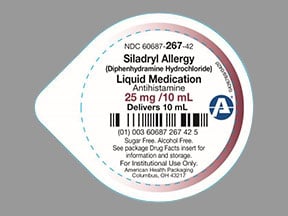
Benadryl Allergy Childrens Coupons & Savings Card – Discount Prices from $7.29
Brand for: Diphenhydramine hcl
My prescription
Edit
118ML of 12.5MG/5ML, Diphenhydramine Hcl (1 Bottle)
Select pharmacy

Walgreens
$7.29
COUPON PRICE
Albertsons
$8.94
COUPON PRICEBenadryl Allergy Childrens savings card
Show this card to your pharmacist
Walgreens
$7.29
BIN
ID
PCN
GRP
011867
LHBFD514BB
HT
LABH001
Powered by
More prescriptions for Parkinson's disease
More prescriptions for Parkinson's disease
Benadryl Allergy Childrens (Diphenhydramine Hcl) dosage forms
Dosage Quantity Price from Per unit 10ML of 12.5MG/5ML 1 Box $9.16 $9.16 10ML of 12.5MG/5ML 2 Boxes $9.33 $4.67 10ML of 12.5MG/5ML 3 Boxes $9.49 $3.16
| Dosage | Quantity | Price from | Per unit |
|---|---|---|---|
| 10ML of 12.5MG/5ML | 1 Box | $9.16 | $9.16 |
| 10ML of 12.5MG/5ML | 2 Boxes | $9.33 | $4.67 |
| 10ML of 12.5MG/5ML | 3 Boxes | $9.49 | $3.16 |
Why is Benadryl no longer recommended for kids?
Benadryl is no longer recommended for children, particularly those under the age of six, due to concerns about potential side effects and the risk of overdose. Antihistamines like Benadryl can cause sedation, agitation, and, in some cases, serious side effects such as respiratory depression. Additionally, there is a risk of incorrect dosing, which can lead to toxicity. Safer alternatives are often recommended for managing allergies or cold symptoms in children. It is always best to consult a healthcare professional for appropriate treatment options for children.
Is children's Benadryl good for seasonal allergies?
Children's Benadryl, which contains the active ingredient diphenhydramine, can be effective in relieving symptoms of seasonal allergies such as runny nose, sneezing, and itchy eyes. However, it may cause drowsiness, so it's important to consider this side effect. It's advisable to consult with a healthcare professional to determine the most appropriate treatment for a child's specific allergy symptoms.
Is Zyrtec better than Benadryl for kids?
Zyrtec and Benadryl are both antihistamines used to treat allergy symptoms, but they have different profiles. Zyrtec (cetirizine) is a second-generation antihistamine that is less likely to cause drowsiness and is often preferred for daytime use. Benadryl (diphenhydramine) is a first-generation antihistamine that can cause significant drowsiness and is sometimes used for its sedative effects.For children, Zyrtec is generally considered a better option for managing allergies without causing sedation. However, the choice between the two should be based on the specific symptoms, the child's response to the medication, and guidance from a healthcare provider. Always consult a pediatrician before administering any medication to a child.
Why can't you give children under 2 Benadryl?
Benadryl, or diphenhydramine, is generally not recommended for children under 2 years old due to the risk of serious side effects, including severe drowsiness, respiratory depression, and in some cases, paradoxical excitation. Additionally, young children are more susceptible to the potential for overdose, which can be dangerous. It is important to consult a healthcare provider for appropriate treatment options for young children.
